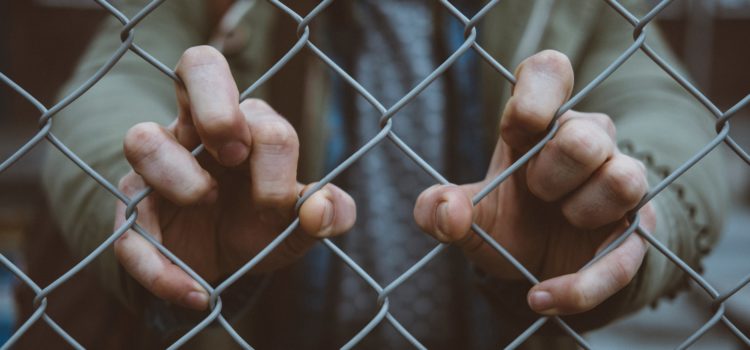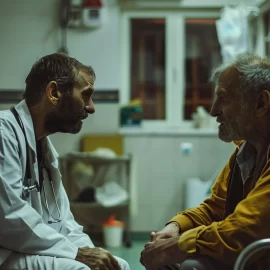

This article is an excerpt from the Shortform summary of "Unbroken" by Laura Hillenbrand. Shortform has the world's best summaries of books you should be reading.
Like this article? Sign up for a free trial here .
What was Ofuna prison camp ? How did Louis Zamperini deal with being imprisoned there?
Ofuna prison camp was a POW camp in Japan during World War II. Zamperini, an American POW, was held there for a time before being transferred to Omori. Ofuna was an unofficial camp and was not registered with the Red Cross, which made it an especially dangerous place to be.
Ofuna Prison Camp: Off the Books
After journeying for three weeks by ship, Louis and Phil were dropped off at Ofuna prison camp, a secret POW camp in Japan. When they arrived, Louis was granted the first bath he’d had since leaving Hawaii, then led to a room where his USC buddy Jimmie Sasaki was seated.
Louis was never privy to the suspicions and investigations surrounding Jimmie back home, so he was dumbfounded to see this man at a prison camp. They spoke for a long time, with Jimmie mostly reminiscing about their days at USC or bragging about his high-ranking position in the Japanese military. Louis thought Jimmie had been the one to authorize his stay of execution and expected something to happen after seeing him, but nothing did. Louis was taken out of the room and into the yard where he met 200 fellow prisoners.
Ofuna was not on the radar of the Red Cross because it was not registered as an official POW camp. The guards and officials who ran the camp did not abide by the rules of the Geneva Convention regarding prisoners of war. Instead, the camp operated under different sets of rules instituted to break and humiliate the captives.
Prisoners could not speak or make eye contact with each other; eyes had to be cast down at all times; prisoners had to learn Japanese in order to understand instructions; each morning started with tenko, or roll call; and every aspect of camp life had to be followed to the tee. Any deviation from these rules elicited harsh beatings.
Because no one outside Japan knew about the camp, the beatings could be as vicious as the guards wanted. Death was not off the table for anyone. The guards used clubs to beat the men, and any attempt a prisoner made to protect himself or help others led to increased violence. The most feared guard of all was a man nicknamed “The Quack,” who was particularly cruel and sadistic.
The men at Ofuna prison camp were emaciated and made to starve while guards pilfered the food shipments. Rations consisted of putrid broth and contaminated rice, neither of which had any nutritional value. Dysentery was rampant, and Louis grew so thin, he could barely stand. He thought Jimmie, who visited often, would help him, but all Jimmie ever did was talk about USC. If it wasn’t for the help of two kitchen aids, who slipped Louis extra balls of rice, he likely wouldn’t have survived.
Tactical Measures at Ofuna Prison Camp
Most of the men imprisoned at Ofuna prison camp were American soldiers, either ranking officials or enlisted servicemen. Their shared training was put to use in a number of subversive ways to gain information and food.
The underground resistance movement was small and did nothing to change the men’s circumstances, but the ability to gain knowledge about the war and dupe their guards served to give each man a sense of purpose and dignity. What on the outside seemed like full compliance to the rules was actually a network of whispered communications.
Whenever guards were out of earshot, the prisoners would talk without moving their lips. Others passed information to each other by pretending to ask the guards questions in English, which they couldn’t understand. They used Morse code by tapping sticks or clicking their tongues. Others found ways to make journals out of rice paste and stole pencils to document the horrors of the camp. Louis kept detailed accounts of his time at Ofuna and the names and addresses of other men in camp and hid his diary under floorboards in his cell.
What the men wanted most of all was knowledge of the war’s progression. Whenever new POWs were brought to camp, the underground network found ways of mining them for information. Japanese newspapers appeared in camp every now and then, and the prisoners were quick to steal them and get them to American translators. One of these men was a twenty-five-year-old Marine officer named William Harris, who would become one of Louis’s closest friends and an important cog in the resistance wheel.
A Man Among Men
William Harris’s skills would serve as both a salvation and curse for the men at Ofuna prison camp. He was part of a downed mission in Japanese territory and had managed to escape. He made a run for China, stalking through the woods and consuming ants to survive. He was close to the Chinese border when he was discovered by Japanese civilians and turned in to authorities.
William was a large man, standing at 6’3”, was an actual genius, spoke five languages, and had a photographic memory. He and Louis met one day during forced exercise and formed an instant bond. Louis had not had a real comrade since Phil was taken to a different part of the camp on arrival. The two set their minds to finding more ways to subvert their captors.
William created a Japanese-English dictionary on one of the rice paste journals to help men decipher the newspapers. Louis also stole newspapers when no one was looking and took them to William, who would look at a map, memorize it, and recreate it on a scrap of paper. Through these tactics, the prisoners learned that the allies were winning the war, which helped inspire them and give them hope for rescue. But that hope came with a weighty fear.
All over Japan, thousands of POWs were falling victim to the “kill order,” or the Japanese military policy to never allow prisoners to be recaptured by the allies. If an invasion was imminent, the guards were ordered to kill all the men. If the allies kept advancing, Louis and the others wondered if they’d survive long enough to see victory.
A Time of Loss
In all facets of Louis’s life, loss was being felt. Louis first felt this loss in spring 1944 when Phil was transferred from Ofuna to another POW camp. The two men, who’d experienced so much together, only had a few moments to bid farewell. Phil and Louis said goodbye and promised to reconnect in the future when all of their struggles were over. Louis believed his friend was going to an official camp, but Phil was taken to another secret camp that sold the prisoners to local businesses for slave labor.
Ofuna prison camp was not the last of Louis Zamperini’s nightmare experience. While Louis did eventually leave Ofuna prison camp, his circumstances at Omori prison camp weren’t any better. Louis was liberated from the POW camp in September of 1945.

———End of Preview———
Like what you just read? Read the rest of the world's best summary of Laura Hillenbrand's "Unbroken" at Shortform .
Here's what you'll find in our full Unbroken summary :
- How Louie Zamperini was on track to become an Olympic athlete until the war started
- The unbelievable story of his capture as a prisoner of war
- The ultimate fate of Louie and his captors






